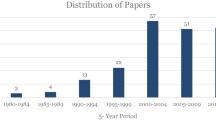Abstract
This paper proposes a conception of mutual advantage as a motivation for cooperative behaviour. This motivation is contrasted with the ‘emotional’ reciprocity that is represented in current theories of social preferences. The paper explores parallels between mutual advantage and Humean analyses of convention and between mutual advantage and theories of team reasoning.

Similar content being viewed by others
References
Bacharach M (2006) Beyond individual choice. In: Gold N, Sugden R (eds). Princeton University Press, Princeton
Berg J, Dickhaut J, McCabe K (1995) Trust, reciprocity, and social history. Games Econ Behav 10:122–142
Bolton G, Ockenfels A (2000) ERC: a theory of equity, reciprocity and competition. Am Econ Rev 90:166–193
Bruni L, Sugden R (2008) Fraternity: why the market need not be a morally free zone. Econ Phil 24:35–64
Dufwenberg M, Kirchsteiger G (2004) A theory of sequential reciprocity. Games Econ Behav 47:268–298
Fehr E, Schmidt K (1999) A theory of fairness, competition and cooperation. Quart J Econ 114:817–868
Genovesi A (2005 [1765–67]) Delle lezioni di commercio o sia di economia civile. Instituto Italiano per gli Studi Filofící, Napoli
Hobbes T (1961 [1651]) Leviathan. Macmillan, London
Hume D (1978 [1739–1740]) A treatise of human nature. Oxford University Press, Oxford
Lewis D (1969) Convention: a philosophical study. Harvard University Press, Cambridge
Rabin M (1993) Incorporating fairness into game theory and economics. Am Econ Rev 83:1281–1302
Schelling T (1960) The strategy of conflict. Harvard University Press, Cambridge
Smith A (1976 [1759]) The theory of moral sentiments. Clarendon Press, Oxford
Smith A (1976 [1776]) An inquiry into the nature and causes of the wealth of nations. Clarendon Press, Oxford
Sugden R (1984) Reciprocity: the supply of public goods through voluntary contributions. Econ J 94:772–787
Sugden R (1993) Thinking as a team: toward an explanation of nonselfish behavior. Social Phil Policy 10:69–89
Sugden R (2003) The logic of team reasoning. Phil Explor 6:165–181
Sugden R (2004) The economics of rights, cooperation and welfare, 2nd edn. Palgrave Macmillan, Basingstoke First edition 1986
Sugden R, Zamarrón I (2006) Finding the key: the riddle of focal points. J Econ Psychol 27:609–621
Acknowledgments
This paper is based on a lecture that I gave at a ‘Workshop in Honour of Robert Sugden’ held at the Faculty of Political Sciences of the University of Naples ‘Federico II’ in May 2010. I am very grateful to Sergio Beraldo, Luigino Bruni and everyone else who contributed to the success of this workshop. I was touched that so many of my present and former research students, and so many people with whom I have worked over the years, wanted to participate. The theme of the lecture is a conception of economic and social life as a scheme of cooperation, rather than (as it is all too often seen as) a positional competition. In choosing this topic, I wanted to express my appreciation of the ethos of cooperation, friendship and commitment to the discovery of truth that characterises the community of researchers to which I am proud to belong.
Author information
Authors and Affiliations
Corresponding author
Additional information
SI: Honor of Robert Sugden.
Rights and permissions
About this article
Cite this article
Sugden, R. Mutual advantage, conventions and team reasoning. Int Rev Econ 58, 9–20 (2011). https://doi.org/10.1007/s12232-011-0114-0
Published:
Issue Date:
DOI: https://doi.org/10.1007/s12232-011-0114-0




